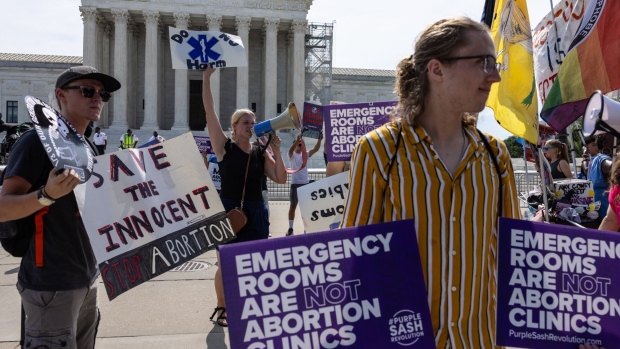Jun 26, 2024
US Ruling Unlikely to Resolve Uncertainty on Emergency Abortions
, Bloomberg News

(Bloomberg) -- The Supreme Court ruling preventing Idaho from enforcing its abortion ban in medical emergencies for the time being continues to leave pregnant women at risk, reproductive health advocates warn.
The Court handed down its 6-3 ruling on Thursday, a day after a draft of the decision against the state of Idaho was prematurely posted to the Supreme Court’s website. The case will now go before the appeals court for further debate
“It is incredibly frustrating, period, to not be able to provide care for patients as we know it should be provided,” said Nisha Verma, an obstetrician and gynecologist and a fellow at the American College of Obstetricians and Gynecologists. She said the lack of clarity for doctors extends beyond Idaho. “Working here in Georgia we are constantly in a state of confusion trying to navigate laws that just don’t make sense on the ground.”
Idaho has one of the most restrictive abortion bans in the US, making it a crime for any person to perform an abortion for health emergencies unless it’s to save the woman’s life. The state law clashed with a 1986 federal law designed to ensure that hospitals provide emergency treatment regardless of a patient’s ability to pay. Under the Emergency Medical Treatment & Labor Act, or EMTALA, hospitals are required to stabilize patients before discharging them, even if that means terminating a pregnancy.
The tension between EMTALA and Idaho’s near-total abortion ban has created problems for doctors and hospitals who say some patients are receiving poor quality care because of the uncertainty created by laws that threaten doctors with the revocation of their medical license or prison time.
Unresolved
Under the opinion, the court wouldn’t answer broader questions about the intersection of state abortion bans and a federal law designed to ensure hospitals can treat patients who arrive in need of emergency care.
“It doesn’t seem like the court is saying they’re resolving the issue about what EMTALA says about emergency abortions,” said Gretchen Borchelt, vice president for reproductive rights and health at the National Women’s Law Center, after the news broke Wednesday. “There have been cases in Texas where people tried to get emergency abortion care and were refused. Doctors and patients were hoping this case would provide clarity and it doesn’t.”
The uncertainty is already causing problems in health care. States with near-total abortion bans have seen a more pronounced drop in applications for their obstetrics and gynecology residency programs from 2022 to 2024 when compared with other states, according to ACOG. Idaho is one of a small number of US states that lack OB/GYN residency programs, increasing the risk for an OB/GYN shortage. Three Idaho hospital labor and delivery departments have closed since March 2023 because of the lack of clinicians.
“OB/GYNs are leaving these restrictive states,” said Michael Belmonte, an OB/GYN and fellow at ACOG. “It’s not just those who are currently practicing but it also applies to medical students when they’re deciding where they want to go for their residency and beyond.”
Kelly Blanchard, the president of abortion rights advocacy group Ibis Reproductive Health, said she hopes a decision against the state of Idaho will help provide some clarity to health care providers and hospitals. “I hope those providers will also have support from their administrators and the places where they work,” she said.
The general sense from anti-abortion groups and advocates was that the SCOTUS ruling is anything but the end of the road. The case would work its way through the courts and many were confident that there would be further litigation on this issue.
“It is highly likely the Court will see this case again,” said Brittany Jones, general counsel for Kansas Family Foundation, an anti-abortion group. “This is only the beginning.”
In the meantime, doctors in states with abortion bans say they’re walking on eggshells to provide care without risking their medical licenses or imprisonment.
“We are talking about criminalizing life-saving health care,” said Colleen McNicholas, the chief medical officer at Planned Parenthood of St. Louis. Bans like Idaho’s “are forcing us to abandon the oaths that we took to care for patients.”
--With assistance from Anna Kitanaka.
(Updates with new information throughout.)
©2024 Bloomberg L.P.


